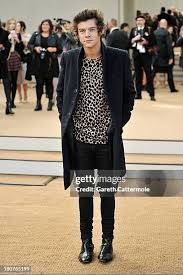
Introduction
Harry Styles, a name that has become synonymous with modern pop music, has been captivating audiences worldwide since his career’s inception as a member of the globally acclaimed boy band One Direction. In recent years, Styles has transitioned to a successful solo career, showcasing his versatility and artistic evolution. His relevance in today’s music scene is underscored not only by chart-topping hits but also by his unique fashion sense and advocacy for inclusivity. Understanding Styles’ influence offers insights into contemporary pop culture and the transformative nature of the music industry.
Harry Styles: Career Beginnings
Harry Styles was born on February 1, 1994, in Redditch, Worcestershire, England. His rise to fame began in 2010 when he auditioned for the British television series The X Factor. Although he was eliminated as a solo artist, he was subsequently grouped with four other contestants to form One Direction, which went on to become one of the best-selling boy bands of all time. After the group’s hiatus in 2016, Styles embarked on a solo career, releasing his self-titled debut album in 2017, which received critical acclaim and commercial success.
Solo Success and Musical Evolution
Harry Styles’ solo work has showcased his growth as an artist, with his sound evolving significantly from the boy band pop of One Direction to a more rock and folk-influenced style. His sophomore album, Fine Line, released in December 2019, featured hits like “Adore You” and “Watermelon Sugar,” further solidifying his status as a solo artist. The album received multiple Grammy nominations and won Best Pop Solo Performance for “Watermelon Sugar”. The artistic maturity expressed in his music has resonated deeply with fans and critics alike, often touching on themes of love, self-identity, and mental health.
Fashion and Cultural Impact
Beyond music, Styles has made significant waves in fashion, often challenging traditional norms with his gender-fluid style. He has collaborated with luxury brands, notably Gucci, becoming a muse for creative director Alessandro Michele. His bold fashion choices have sparked discussions about masculinity and self-expression, further amplifying his impact on contemporary culture. Additionally, Styles has used his platform to advocate for various social issues, including mental health awareness and LGBTQ+ rights, demonstrating a commitment to making a positive difference.
Conclusion
As Harry Styles continues to create and innovate, his influence on the music industry and popular culture remains profound. His ability to connect with audiences through his artistry and advocacy positions him as a leading figure in the evolution of modern pop. Looking ahead, fans eagerly anticipate his upcoming projects, which are sure to further push the boundaries of music and fashion. Styles’ journey exemplifies the power of art to inspire change and challenge societal norms, making him not just a musician but a cultural icon.
You may also like

The Importance of Storytelling in Modern Society

The Evolving Career of Louis Tomlinson

Understanding the Fall Season: Change, Beauty, and Tradition
SEARCH
LAST NEWS
- Radio 4: Exploring the Comedy Landscape with Al, Ayo, Bella, and More
- Fast results: Chaos at the USATF Half Marathon Championships
- Dvsa driving test: Public Calls for Stricter Penalties Against Cheating
- Alarm: Enhance Your Sleep Quality with Effective Solutions
- Silver price: Significant Surge Amid Geopolitical Tensions